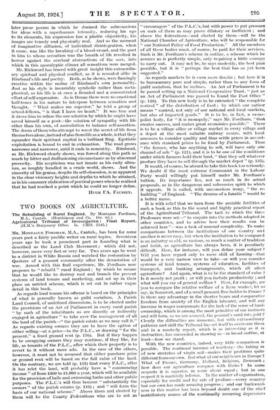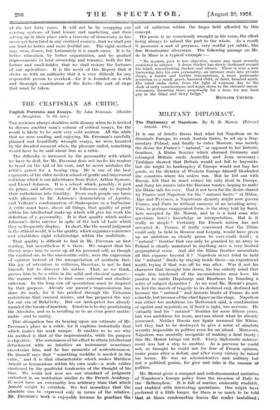TWO BOOKS ON AGRICULTURE.
The Rebuilding of Rural England. By Montague Fordham, M.A., Cantab. (Hutchinson and Co. 10s. 6d.) Agricultural Tribunal of Investigation : Final Report. (H.M.'s Stationery Office. 5s. CMD. 2145.)
Ma. MONTAGUE FORDTIAM, M.A., Cantab., has been for some • years past a fairly prolific writer on rural topics. Seventeen years ago he took a prominent part in founding what is described as the Land Club Movement ; which did not, however, move very fast or very far. Two years ago he went to a district in White Russia and watched the restoration by Quakers of a peasant community after the devastation of war. Armed with this frail experience, Mr. Fordham now proposes to " rebuild " rural England ; by which he means that he would like to destroy root and branch the present systems of land tenure and marketing, and set up in their place an untried scheme, which is set out in rather vague detail in this book.
As regards land tenure his scheme is based on the principles of what is generally known as guild socialism. A Parish Land Council, of undefined dimensions, is to be elected under the provisions of an Act of Parliament in every rural parish "by such of the inhabitants as are directly or indirectly engaged in agriculture" to take over the management of all the land of the parish—" the parish estate as we may call it." As regards existing -owners they are to have the option of either selling—at a price—to the P.L.C., or drawing " for the present," a fixed ground rent (p. 110). But if they happen to be occupying owners they may continue, if they like, for life, as tenants of the P.L.C., after which their property is to revert to it without more ado. In the case of the others, however, it must net be assumed that either purchase price or ground rent will be based on the full value of the land. On the contrary, we are told (p. 133) that-every P.L.C., after it has relet the land, will probably have a "commencing income" of from E500 to 11,000 a year, which will be available for the provision of halls and swimming baths and other public purposes. The P.L.C.'s will thus become "substantially the owners" of the parish estates (p. 110) ; and "will form the basis of our national scheme." Above them and elected by them will be the County Federations who are to act as "encouragers" of the P.L.C.'s, but with power to put pressure on such of them as may prove dilatory or inefficient ; and above the federations—and elected by them--will be the National Chamber of Agriculture, who will be responsible for "our National Policy of Food Production." All the members of all these bodies must, of course, be paid for their services.
Such is Mr. Fordham's scheme in outline, a scheme which he assures us is perfectly simple, only requiring a little courage to carry out. It may not be, he says modestly, the best plan possible, but it is "perhaps the best that has as yet been suggested."
As regards markets he is even more drastic ; but here it is to bureaucracy pure and simple, rather than to any form of
guild socialism, that he inclines. An Act of Parliament is to be passed setting up a National Co-operative Trust, "just as an Act of Parliament was passed to found the Post Office" •
(p. 120). To this new body is to be entrusted "the complete control" of the distribution of food ; by which our author means "control, not only of our national and local markets, but also of imported goods." It is to be, in fact, a mono- polist body, for "it is monopoly," says Mr. Fordham, 'that creates success, and makes great economies possible." There is to be a village office or village market in every village and a depot at the most suitable railway centre, with local assessors to consider quality and thus settle prices in accord- ance with standard prices to be fixed by Parliament. Thus " the farmer, who has anything to sell, will have only one channel of sale" (p. 121), and it is to be one of the conditions under which farmers hold their land, "that they sell whatever produce they have to sell through the market depot" (p. 135).
It would, of course, be absurd to take this book too seriously. We doubt if the most extreme Communist in the Labour Party would willingly put himself under Mr. Fordham's tuition. Its importance lies, not so much in its actual proposals, as in the dangerous and subversive spirit to which it appeals. It is called, with unconscious irony, "the re- building" of England. "The dreams of a fanatic" would be a better name.
It is with relief that we turn from the amiable futilities of such a book as this to the sound and highly practical report of the Agricultural Tribunal. The task to which the three Professors were set—" to enquire into the methods adopted in other countries, and to advise how their results can be achieved here "—was a task of unusual complexity. To make comparisons between the institutions of one country and another is never easy, but when the institution to be compared is an industry so old, so various, so much a matter of tradition and habit, as agriculture has always been, it is peculiarly difficult. How, for instance, will you define your subject ? Will you have regard only to mere skill of farming—that would be a very narrow view to take—or will you consider systems of land tenure, systems of education, facilities of transport, and banking arrangements, which all affect agriculture? And again, what is to be the standard of value ? Is it merely net profit ; or will you include productivity ; and what will you say of general welfare ? How, for example, are you to compare the relative welfare of a farm worker, let us say, in Somerset, and of a small peasant free-holder in France ? Is there any advantage in the shorter hours and comparative freedom from anxiety of the English labourer, and will any increase in wages compensate for the lack of the sense of land- ownership, which is among the most primitive of our instincts and will turn, so we are assured, the peasant's sand into gold ? Clearly the difficulties are immense, but with extraordinary patience and skill the Tribunal has set itself to overcome them and in a masterly report, which is as interesting as it is instructive, has succeeded in showing us—in broad outline, at least—how we stand.
With the new countries, indeed, very little comparison is possible. The continual increase of territory—the taking in of new stretches of virgin soil—makes their problems quite different from our own. But what of our neighbours in Europe? What of France, Germany, Holland, Belgium, Denmark ; how does our agriculture compare with theirs ? In some respects it is superior, in some about equal ; but in one respect it is markedly inferior. In the matter of organisation, especially for credit and for sale of produce—every country but our own has made amazing progress ; and our backward- ness in this matter has been beyond doubt one of the chief contributory causes of the continually recurring depressions of the last forty years. It will not be by scrapping our existing systems of land tenure and marketing, and then setting up in their place such a travesty of democracy as has never yet been tried in any civilized country, that we shall put our land to better and more fruitful use. The right method may seem slower, but fortunately it is much surer. It is by better education, by better organization, and by gradual improvements in land ownership and tenancy, both for the farmer and small-holder, that we shall restore the fortunes of our agriculture. It is the merit of this Report that it shows us with an authority that it is very difficult for any responsible person to overlook—for it is founded on a wide and thorough examination of the facts—the sort of steps that mast be taken.



































 Previous page
Previous page